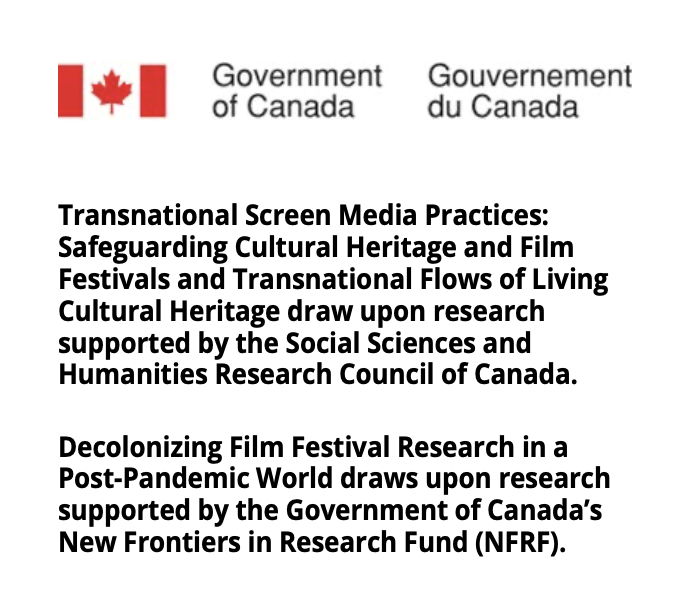Dr. Sheila Petty, FRSC, Professor of Media Studies and SaskPower Research Chair in Cultural Heritage, at the University of Regina, explores transnational movements of living cultural heritage in African screen media
My research program investigates transnational methodologies in the expression and safeguarding of intangible and tangible cultural heritage (screen media). It proposes a reflection on current debates around identity politics in globalizing cultures, political and cultural sovereignty, control of representation in image production, and modes of resistance to colonialism in African screen media.
A current focus in the humanities includes discussions of ongoing migration crises, border-crossing experiences, and issues of global mobility. Within this context, scholars are also pondering the nature of traveling ideas and theories. Theorists of globalization, such as the Martinican Edouard Glissant and the Moroccan Abdelkébir Khatibi, have cautioned that local histories are also the products of global interactions, including colonialism.
Within this context, I am interested in what happens to knowledge, cultural expressions, and creative forms that arise in Africa and then travel around the globe, ending up in different geographical locations and reconfiguring to local contexts.
Transnational movements of living cultural heritage
In June 2021, in collaboration with Dr. Charity Marsh, I organized Transnational Screen Media Practices: Safeguarding Cultural Heritage at the University of Regina, a virtual, free, and open-access symposium for the general and academic public. This symposium and film screenings brought together scholars, media artists, cultural practitioners, industry funders (Canada Media Fund and Banff Institute), and policymakers from different areas of the world (Canada, Brazil, Mexico, Morocco, and the United Kingdom) grappling with common issues around the safeguarding, presentation, and documentation of living cultural heritage in the domain of screen media.
The Humanities Research Institute Barbara Powell Lecture and keynote address, “Revitalisation de la langue Amazighe/ Revitalization of the Amazigh Language,” was presented live in French via Zoom by the Distinguished Professor, Dr. Ahmed Boukouss, Recteur at Institut Royal de la Culture Amazighe, Rabat, Morocco. The film screenings were available throughout the symposium on an online platform, and all presentations have been archived on the Humanities Research Institute website for general public open access.
African screen media in the world
The conference project’s transnational focus was further developed into a festival project that brought together some of the conference scholars and industry proponents and new ones to create a transnational festival partnership, “Film Festivals and Transnational Flows of Living Cultural Heritage: Africa in the World.”
This project represents a strategic alliance between researchers in academic institutions in Canada, the U.S., Brazil, and the UK and festival/ community partners committed to investigating how flows of knowledge that arise from the African continent arrive at diaspora-based African film festivals and are realized/transformed through new contexts of presentation and engagement in new locations.
This project also involves the creation of open-access documentation and sustainable archiving practices through a ‘festival-knowledge forum’ to contribute to audio-visual memory while also ensuring that control over the cultural outputs and their presentation to the broader world is in the hands of those within the community in question.
In April 2023, the “Africa in the World” project teamed up with the African Documentary Film Collective (Dr. Sada Niang, University of Victoria; Dr. Suzanne Crosta, McMaster University; and Dr. Alexie Tcheuyap, University of Toronto) to host the academic conference, Marginalité et Fragilité dans les Cinémas Africains/Marginality and Fragility in African Cinemas at the 39th edition of Vues d’Afrique film festival in Montreal.

Investigating methods to decolonize festival research
During the festival, my project, with Co-Principal Investigator Dr. Estrella Sendra of King’s College London, also held workshops. “Decolonizing Film Festival Research in a Post-Pandemic World” proposes a first step in decolonizing film festival research by bringing together an international team of African film festival researchers to investigate methods to decolonize festival research.
As a team, we have designed and trialed an innovative and accessible two-part Decolonial Test that can firstly identify potential unconscious bias in the research design itself and secondly, develop a series of justice, equity, diversity, and inclusion variables that can foster inclusive, dialogical, and polycentric ways of knowledge production and dissemination which will, in turn, ensure ownership of the process for communities concerned. Results of this project are available for open access in English and French (Wolof coming soon!).
The next generation of curators and knowledge keepers
These conferences have workshopped new methodologies and practices of presentation, curation, archiving, and festivalization to contribute to audio-visual memory and train and mentor the next generation of curators and knowledge keepers.


This work is licensed under Creative Commons Attribution-NonCommercial-NoDerivatives 4.0 International.


